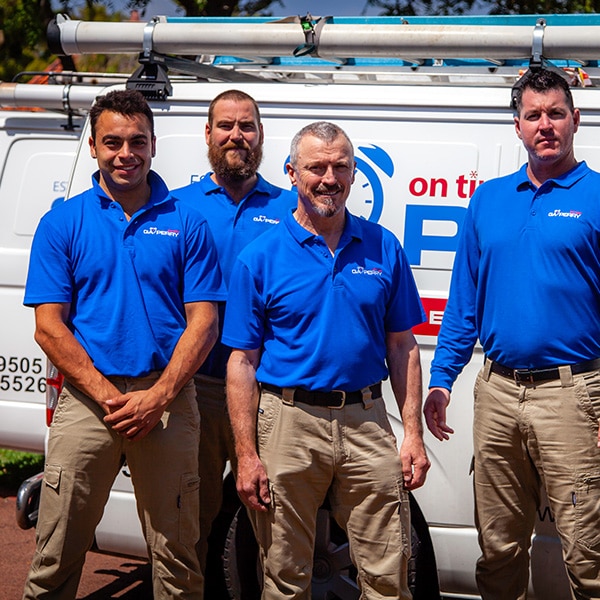Installation, Repair & Replacement
GA Perry provides hot water system installation, replace and replacement throughout the Perth metro Area. With a wealth of knowledge from 124 years in business we can help you get your hot water running.
Our experienced team of skilled plumbers, electricians and gas fitters make us the number one choice for Perth homeowners. Whether you need to repair or install a gas or electric hot water system, you have come to the right place. The GA PERRY team will offer you the best free advice, ensuring you are well-informed to choose the best hot water Perth solution for your home.

See our hot water system prices in Perth. Need a hand choosing the right hot water system? No problem contact us now.





We know that choosing a hot water system can be a big decision, but you don’t have to do it alone. Our plumbers at GA PERRY can help select a unit that is ideal for your family home, budget and energy needs. Running a hot water system can use a lot of energy, so choosing the right system will save you money whilst ensuring you never run out of hot water or heat up unnecessary water.
GA PERRY provides service, repair and installation for electric and gas hot water systems. Electric systems cost less upfront, although over time, the cost to run the units is considerably higher. On the other hand, gas systems are more expensive up front, but you’ll save on monthly bills. We will help you choose between storage-based and instantaneous hot water systems. Storage hot water systems store hot water that’s heated up by an electrical element or gas burner. This enables the unit to be ready for showers and dishwashing at the drop of a hat. Continuous flow or instantaneous systems provide hot water when you need it.
Talk to us today for advice on the best system to suit your family and lifestyle.

The main difference between instant (continuous flow) and storage hot water systems is how they heat and deliver water. Instant systems heat water on demand, so you only heat what you use and never run out, making them more energy-efficient. Storage systems heat and store a set amount of water in a tank, ready for use, but once the hot water runs out, you have to wait for the tank to reheat. Instant systems are more compact but may struggle with multiple taps running at once, while storage systems handle high simultaneous use better but can lose heat over time.
Your individual circumstances will determine whether a gas or electric hot water system is best. Gas systems heat water faster, are usually cheaper to run, and are therefore ideal for high-demand homes. Electric systems are frequently less expensive to install and operate. Electric systems are ideal for homes where gas is not available and are often simpler to install. Although electric gives greater flexibility, often gas is more affordable in terms of operating costs.
If your hot water system is getting on in years—usually between 8 and 15 years—it could be time to start planning a replacement. Some obvious indicators are rusty or discoloured water flowing from your taps, leaks or water gathering around the base of the system, and water that consistently goes hot and cold for no apparent reason. You may also find the system producing unusual rumbling or pounding sounds or that you are running out of hot water far faster than before. Signs something’s not right also include an inexplicable increase in your energy bills, obvious rust on the outside of the tank, or a continuously leaking pressure release valve. If you are encountering more than one of these problems, it is most likely wiser—and less expensive over time—to replace the system than constantly fixing it.
To reduce the running cost of your hot water system, try lowering the thermostat to 60°C, insulating your hot water pipes, and using off-peak electricity if available. Fix any leaking taps to avoid wasting hot water, and consider upgrading to a more energy-efficient system for long-term savings.
Continuous flow (instantaneous) hot water systems can be better than storage tanks if you want endless hot water and greater energy efficiency, as they only heat water when you need it. However, they may struggle to supply multiple taps at once, and installation costs can be higher. Storage tanks, on the other hand, are better for meeting high demand at the same time but can run out of hot water and lose heat over time.
The right size hot water system will depend on your home’s occupancy rate as well as your hot water use. A small home may need a 125–160L storage tank or a 16L/min continuous flow system as a reference; a family of four might need a 250L tank or a 20L/min system. It also depends on when and how you consume hot water; if everyone showers at once, you will need a larger system.